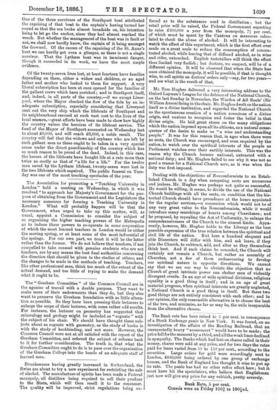Dealing with the objections of Nonconformists to an Estab- lished
Church in a day when competing sects are numerous and jealous, Mr. Hughes was perhaps not quite so successful. He would be willing, it seems, to divide the use of the National Church buildings with all the sects, on condition that the his- torical Church should have precedence at the hours appointed for the regular services,—a concession which would not be of any very great value to the Nonconformists, while it would introduce many searchings of hearts among Churchmen; and he proposed, by repealing the Act of Uniformity, to enlarge the comprehensiveness of the Church to the utmost limits. Appa- rently, however, Mr. Hughes holds to the Liturgy as the best possible expression of the true relation between the spiritual and civil life of the nation. But here a hundred eloquent and able Dissenters will differ with him, and ask leave, if they join the Church, to subtract, add, and alter as they themselves think best. And if such claims be conceded, the Church will certainly not remain a Church, bat rather an assembly of Churches, not a few of them endeavouring to develop our spiritual nature in opposite directions. We cannot say that we see our way to obviate the objection that no Church of great intrinsic power can shelter men of violently divergent creeds. In an age of wide spiritual divisions, religious equality is a good thing in itself; and in an age of great material progress, when spiritual interests are greatly neglected, a National Church is .a good thing in itself. But these two good things are not entirely consistent with each other; and in our opinion, the only reasonable alternative is to choose the best of the two, and minimise, as far as may be, the evils inseparable from the alternative chosen.










































 Previous page
Previous page